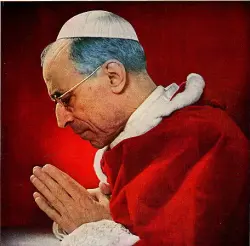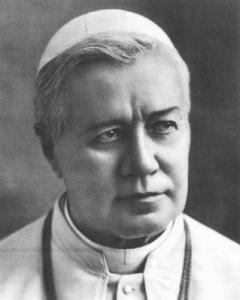“Repubblica” Interview And Explaining The Obvious: Moral Relativism
In another post about explaining the obvious I have examined the astonishing words of the Bishop of Rome concerning the “nonsense” of “proselytism”. Today I would like to say some words more concerning the words immediately following the phrases examined in the other posts.
This time I will follow the text more closely, one phrase at a time, in order to follow with you the conversation as it unfolds. Please always remember, one of the two is the Pope and he has a sacred duty to uphold, defend and propagate the Truth, and transmit it intact. Surely, no generation before V II ever thought any differently about the duties of a Pope.
Dr Scalfari asks:
Santità, esiste una visione del Bene unica? E chi la stabilisce?”
“Your Holiness, is there is a single vision of the Good? And who decides what it is?”
Scalfari poses here a question that politely reveals his moral relativism. But he is the atheist of the two and not the one who is Pope, so this is par for the course.
Naturally a Pope would, in a spontaneous conversation, spontaneously answer what everyone of us would also answer. Something on the lines of: “Of course there is. I am a Catholic, how can you expect from me any other answer? Did not Jesus himself say that he is the Truth, the Way and the Life? If there were many truths, then Jesus’ words, nay His entire message, would evidently be nothing more than a lie and a mockery. Don’t you agree, my dear Dr Scalfari? If you believe that Jesus is God you must – you must – believe that He is The Truth, which means: the Only Truth there is. If I did not believe this, how could I call myself a Catholic, or a Christian come to that?”.
I am not, here, touching deep theological waters. I am not flaunting deep, brilliant quotations. I am not being profound at all. This is rather basic stuff. Stuff taught to children, and that children can readily understand. Our Lord is the Truth. Easy. Anyone of us, talking at the pub with an atheist, would come out with pretty much the same answer.
Well, not anyone, apparently. Francis answers as follows (emphases mine):
«Ciascuno di noi ha una sua visione del Bene e anche del Male. Noi dobbiamo incitarlo a procedere verso quello che lui pensa sia il Bene».
“Each of us has a [sua = his] vision of good and of evil. We have to encourage people to move towards what they think is Good.”
Francis has just been asked whether there is a single vision of the Good. He ignores the matter completely. The existence of a Universal Truth seems not to be his business at all. Instead, he answers like the perfect relativist. Let us say it once again: words follow thoughts. You can’t speak like a relativist unless you think like one. Not at the pub. Not among friends. Not in an interview. Particularly not in the interview. Particularly not when you are – like the name or not – the Pope. Francis does not even try to defend the idea that there is One Truth, and this is the Truth of Christ, Who is Himself the Truth. No. So eager is he to please his interlocutor, that he literally jumps to an astonishing relativistic statement: each one has his own truth, and we (the Church) must encourage him to proceed towards what he thinks is Good.
I do not think a Freemason could have explained the religious views of Freemasonry any better than with Francis’ very words.
Scalfari insists with a clearly important point:
Lei, Santità, l’aveva già scritto nella lettera che mi indirizzò. La coscienza è autonoma, aveva detto, e ciascuno deve obbedire alla propria coscienza. Penso che quello sia uno dei passaggi più coraggiosi detti da un Papa.
“You, Your Holiness, have written that already in your letter to me. The conscience is autonomous, you said, and everyone must obey his conscience. I think that’s one of the most courageous steps taken by a Pope”.
What Dr Scalfari here is politely saying is: “This was truly unbelievable. I never thought I’d see the day where a Pope, of all people, says that the conscience is autonomous and everyone must obey his conscience”. Scalfari, who is fit in Catholic things and says in this interview he won a Catholic prize as a boy, knows perfectly well this is utter bollocks unless one at least explains that the conscience must be properly formed, that is: conformed to Truth (see above) and no one can ever dream his own conscience would prevail over Truth.
Scalfari perfectly well knows all this, because he is fit in Catholicism. Francis doesn’t, because – to put it very charitably – he isn’t. He therefore answers thus:
«E qui lo ripeto. Ciascuno ha una sua idea del Bene e del Male e deve scegliere di seguire il Bene e combattere il Male come lui li concepisce. Basterebbe questo per migliorare il mondo».
“And I repeat it here. Everyone has his own idea of good and evil and must choose to follow the good and fight evil as he conceives them. That would be enough to make the world a better place.”
“E qui lo ripeto” is a very emphatic expression in Italian, far stronger than the usual “e lo ripeto adesso” (“and I repeat it now”). The phrase is often used as “qui lo dico e qui lo ripeto”, or “here I say it and here I repeat it”, to give more emphasis. No Italian reader can have any doubt the man truly wants to make the point.
Note Scalfari has called the phrase one of the most courageous ever pronounced by a Pope. There can be no doubt about the novelty of the statement as Scalfari and his readers understand it. Francis does not correct him. He does not relativise the statement. He does not say: “My dear Dr Scalfari, this is no courage at all! Pure Church teaching! Let me explain…”
No. He agrees with Scalfari, and exmphatically repeats his bold statement. He can hear the atheist applause coming, I am sure.
“Stop reading me through Benedict!” he is emphatically saying. “Stop that! Stop it now! I am very different from him and all our predecessors! When will you understand it!?”.
The message is clear: one must ( which actually means: must) choose ( which actually means: choose) to follow the good and fight evil as he conceives them (which actually means: as he conceives them). This is what, Francis tells us, “everyone must do”. At this point, people blessed with a vivid imagination – like yours truly – picture him opening the window and throwing out 2000 years of Christianity, in the form of a very precious Bible, in the Vatican Gardens below.
Repetita iuvant. Therefore, let us say it once again in case anyone were to concoct some strange interpretation: Francis reassures his interlocutor that the relativistic statement he had made only weeks before – and which had caused such a huge scandal – is truly what he thinks.
There can be no doubt. “And I repeat it here” after being told he has said something enormous doesn’t have many twisting possibilities.
Stop dreaming. Start reading.
Mundabor
Posted on October 6, 2013, in Catholicism, Conservative Catholicism, Traditional Catholicism and tagged Moral Relativism, Pope Francis, Repubblica Interview. Bookmark the permalink. 8 Comments.





















Dear Mundabor. Amen. Well done. The Conservative Catholic Collective is willfully blind to the obvious and by the time they awaken to the smell of myrrh they will have revealed themselves as completely unreliable.
Our Pope is our Cross.
New (long) message scheduled for 5pm, about the latest developments of the interview saga.
I have seen some bloggers have already tried to spin this already.
M
This is disgusting! why doesn’t he just move to Tibet and put on an orange robe? Mother of Christ, pray for us.
No favelas. Cold. No cameras.
M
Mundabor, what do you think of the title on the front page of NewAdvent.org:
‘Dolan confirms errors in Papal interview; Scalfari says article was only “after-the-fact reconstruction” of conversation.’?
I do not see what it changes as far as Francis is concerned. From one side it is – or may appear – a lack of professionalism not to record; but this was, very probably, demanded by the rambling Francis. If there is no recording, then obviously the text is a reconstruction of the conversation.
And?
Francis either approved the reconstruction, or he approved its publication. He can’t escape from this fact.
M
The Truth must be preached in season and out of season….and Frank here isn’t doing that….Reading Francis through Benedict never appealed to those of us with brains considering the fact that both are individuals and are completely different. Just as we didn’t have to read Benedict through JPII…each stands on their own, and no matter how much saving face people try to do, people don’t get it.
As I have already written, you might as well read Hitler through St. Thomas Aquinas…
M